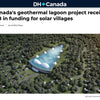Invest in a Airbnb chalet
with the designated builder
![[EN] First look at world's largest geothermal solar lagoon coming to Canada (RENDERINGS)](http://geolagon.com/cdn/shop/articles/dailyhive-vancouver-geoalagon-quebec-spa-canada-biggest-lagoon.jpg?v=1663426121)
First look at world's largest geothermal solar lagoon coming to Canada (RENDERINGS)
Read the full article on dailyhive.com
A small town in Canada is about to become home to the world’s largest geothermal and solar lagoon, and oh boy, does it ever look magical.
While speaking with Daily Hive Urbanized, tech-entrepreneur and geoLAGON developer Louis Massicotte says the 120,000 sq ft lagoon will be heated to 38ºC — for 12 months a year.
Massicotte says the tourism destination draws heavy inspiration from Iceland’s Blue Lagoon, one of the 25 wonders of the world. But something makes Massicotte’s project stand out: it’s on track to becoming the first self-sufficient energy village in the entire world.
In fact, the Quebec native says his goal of creating a self-sufficient village has turned into a race against time versus none other than the richest man in the world, American business magnate Elon Musk.
“I’m hesitant to say we’re in the race against Musk but I think we can do it,” he tells Daily Hive Urbanized, citing that geoLAGON could be built and ready to host people before the Tesla founder’s SunHouse initiative.
“This amazing first will be made possible thanks to the lagoon and its thermal reservoir, which will help to get the 600-home village,” explains Massicotte.
At the centre of each geoLAGON village is an ecosystem that incorporates a reservoir storing heat underneath the lagoon. “The sub-reservoir is heated to 70ºC by solar and geothermal energies and by biomass — without the need to be powered by hydroelectricity.”
What’s more, Massicotte plans to build four geoLAGON villages around Quebec in the future and another eight across Canada. “A lot of work is going into the project,” he says. “Anywhere I built, I won’t need to be connected to Hydro-Québec or any electricity distributor.”
Massicotte has shared an exclusive first look of the magical geoLAGOON with Daily Hive Urbanized, complete with views of the project’s solar-powered chalets village of long-term and short-term rentals, the giant spa, and the restaurant:
Massicotte— the former president of Village Vacances Valcartier, Ice Hotel, and Calypso Park — says his team is “pleased to see the reaction of Quebecers to our patented geoLAGON concept.”
Canada’s first geoLAGON location is being built in Petite-Rivière-Saint-François, about four hours outside of Montreal along the Saint-Lawrence River. Other Canadian site possibilities include Vancouver, Calgary, Toronto, and three more locations in Quebec.
“The choice of Petite-Rivière Saint-Francois is a home run for us because it is the place of choice for investors in the vacation market in eastern Quebec,” says Massicotte. Other Quebec lagoon projects are planned for the Laurentians, Estrie, and Lanaudière.
“As an entrepreneur, I have chosen to try to be an actor of change by creating fully self-sufficient villages thanks to solar, geothermal, biomass and our patent-pending thermal reservoir — which will be installed under the lagoon and will store hot water at 70ºC in order to help heat the village chalets,” says the geoLAGON founder.
Massicotte says 80% of the village’s short-term rental chalets have already been pre-sold to investors and says his engineer studies have confirmed the project’s energy ecosystem will be 100% self-sufficient and net-zero from day one.
The founder says all parking will be underneath the lagoon. “I don’t want too many cars, we’re in the forest and we want to keep it like that.”
Close-up view of the lagoon’s waterfall and on-site restaurant (Louis Massicotte/Submitted)
A rentable chalet and on-site shop (Louis Massicotte/Submitted)
Massicotte says his goal is to sell 100% of short-term rental chalets to investors before the construction — his team’s financing to get cash to build the lagoons. “We never ask for money from subsidies, it’s not necessary. I want to contribute to changing the tourism DNA of northern countries with my lagoons.”
Each 300-double prefab chalet village costs $325 million to develop and construction is set to begin in the spring of 2023.
“Our visitors will be able to rent out solar-powered chalets on Airbnb and live an incredible bathing experience knowing the lagoon and its entire village will be connected to the energies of the Earth and the sun in an infinite and self-sufficient model of clean energy,” concluded Massicotte.
Beating out Musk, building self-sufficient villages, and rivalling wonders of the world — sounds like Canadians aren’t the only ones who could use some time to relax at lagoon spas.
Start picking out those swimsuits, Canada, wintertime is about to get really cozy.



